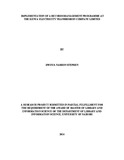| dc.description.abstract | The study sought to determine the effective ways by which organizations can implement
a records management programme as a way of supporting its functions in areas such as
decision making, accountability, transparency while at the same time eliminating vices
like corruption. Founded on the records life cycle and the records continuum, the study
aimed to fulfill four objectives including, identifying the types of records created and
received by KETRACO; finding out if there is a functional records management policy at
KETRACO; determining the existence of a filing classification scheme and its
comprehensiveness; examining records appraisal and retention practice, while assessing
the legislative framework governing the same; the contributions of adopting ICT in the
management of records and investigating the challenges faced in records management
and recommend the best practice for managing records at KETRACO. The study used
both qualitative and quantitative methods focusing on KETRACO as its case study, from
which stratified and purposive sampling technique were used to select 50 employees to
respond to researcher administered questionnaires and another 10 who were interviewed
to enhance the qualitative aspect of the study. The findings were analyzed and presented
in tables, pie charts and bar graphs for qualitative data, while quantitative data was
analyzed through thematic and content analysis. The findings of the study revealed that
the Company runs a decentralized registry system, mainly managed by the secretaries,
with the assistance of records personnel. It was clear that an alphanumeric filing
classification system was in place, however scattered and not comprehensive. The study
established the records tracking system was effective as well as the partial application of
ICT. A great concern was in the lack of a records management policy, a regular records
appraisal practice and disposal. The study therefore recommended quick review and
adoption of the records management policy, revision of the filing classification scheme,
establishment of a central registry system, engagement of more records professionals as
well as appraisal and eventual disposal of inactive records. KETRACO must therefore
ensure the implementation of a functional records management programme for effective
and efficient service delivery in executing its mandate of being a world class electricity
transmission company and the leading interconnector in Africa. | en_US |

